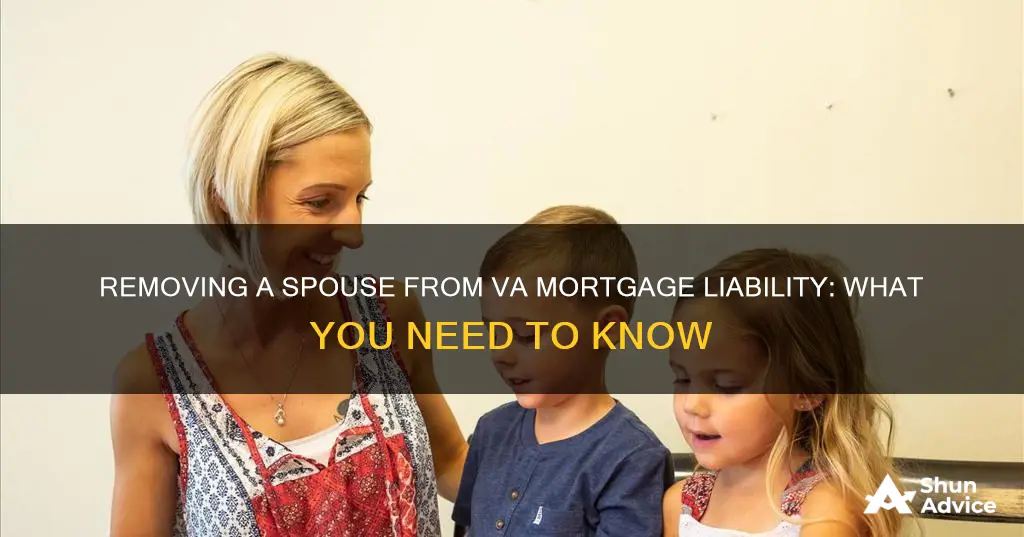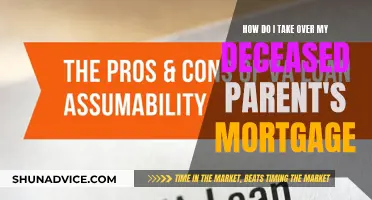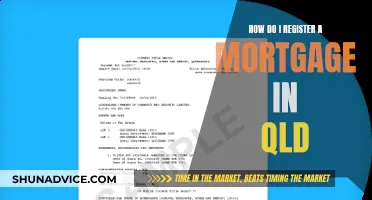
Divorce is stressful, and several practical considerations must be addressed when a married couple decides to part ways. One of the most significant decisions is determining what to do with real estate holdings, especially if a couple financed their home with a VA loan. In such cases, civilian ex-spouses can keep the home secured by a VA loan after a divorce, but they must assume the loan or refinance to another loan type. This article will explore the options available to remove a spouse from a VA mortgage liability.
What You'll Learn

Removing a spouse from a VA loan due to divorce
If you are looking to remove a spouse from a VA loan due to divorce, there are several options available to you. Firstly, it is important to understand that VA loan entitlement is complex, and divorce can further complicate the process. Here are the options to remove a spouse from a VA loan:
Selling the Property
One option is to sell the home and use the proceeds to pay off the VA loan. This offers a clean break for both parties, as the remaining profit can be split between them, and they are no longer obligated to the property.
Refinancing the Loan
If one spouse is keeping the home, they can refinance the VA loan to remove the other spouse. This option requires the spouse keeping the home to qualify for the mortgage on their own based on their credit score and income. During the refinance, the ex-spouse is removed from the loan and property title, meaning they no longer have any claim or responsibility for the property.
Assuming the Loan
The VA loan can also be assumed by one spouse after a divorce, without the need for refinancing. This option releases the original borrower from monthly mortgage payments. However, the VA entitlement would remain with the property, and the veteran would have to wait until the debt is paid in full to restore their entitlement.
Seeking a Release of Liability
Another option is to seek a release of personal liability on the VA loan. This can be done by obtaining a release of liability (ROL) from the VA and providing it to the mortgage servicer to process the removal of the spouse from the loan.
Quitclaim Deed
If the veteran is awarded the home in the divorce decree, they can file a Quitclaim Deed to release the non-veteran spouse from the mortgage. This involves providing the lender with the filed Quitclaim, a copy of the divorce decree, and proof of identity.
It is important to note that removing a spouse from a VA loan due to divorce can be a complex process, and it is recommended to seek guidance from a specialist or legal professional to ensure all necessary steps are taken.
Exploring Options: Strategies to Temporarily Pause Mortgage Payments
You may want to see also

Selling the property and paying off the VA loan
When a couple decides to sell their home financed by a VA loan, the proceeds from the sale are used to pay off the outstanding loan balance. Any remaining profit after the loan has been paid off is then split between the two parties. This ensures that both spouses receive a fair share of the equity built up in the home.
It is important to note that selling the property does not automatically release the spouses from the loan itself. To remove a spouse from the loan, a refinance is typically required. This can be done through a conventional refinance, where the spouse keeping the home refinances the property in their name only. Alternatively, if the veteran spouse wishes to retain the VA loan benefit, they can seek a release of liability or personal liability on the VA loan. This option allows the veteran spouse to retain their VA loan entitlement and avoid the potential downsides of a refinance.
In the case of a divorce, the veteran spouse can restore their VA loan entitlement by selling the home and having the civilian spouse assume the mortgage or refinance the loan. This option ensures that the veteran's future purchase power is not affected, as their entitlement will no longer be tied to the property.
Overall, selling the property and paying off the VA loan can be a straightforward way to remove a spouse from mortgage liability. It provides a clean break and allows both parties to move forward without further financial obligations to each other or the property. However, it is important to carefully consider the financial implications and explore all available options before making a decision.
Making Woolwich Mortgage Overpayments: A Step-by-Step Guide
You may want to see also

Having the civilian spouse assume the VA loan
If you are a veteran who has financed your home with a VA loan and you are facing a divorce, you have several options to handle the property. One option is to have your civilian spouse assume the VA loan. This option is available if your spouse was a co-signer on the loan. In this case, your spouse can keep the home and assume the existing VA loan, but there are some important considerations to keep in mind.
First, it's essential to understand that VA loan occupancy rules state that VA loans can only be used for primary residences. This means that, as a veteran, you cannot retain ownership of the property and rent it to your civilian spouse. Doing so would make the home an income property, which would be a breach of the mortgage contract.
Second, if you choose to have your civilian spouse assume the VA loan, you can be released from further responsibility for the property. However, your VA entitlement would remain with the property. This means that you would have to wait until the debt on the VA mortgage is paid in full before you can restore your entitlement. Not having your full entitlement could limit your future purchase power.
To assume the VA loan, your civilian spouse must meet the lender's requirements in terms of credit and income. They must financially qualify for the mortgage and agree to relieve the Department of Veterans Affairs from its mortgage guarantee. It's important to note that a loan assumption is not the same as a refinance. With a loan assumption, the assuming borrower takes over the original mortgage, not a new one.
Before making any decisions, it's recommended to speak with a VA loan expert or a qualified professional who can guide you through the process and help you understand your specific options and considerations.
Removing a Spouse from a Mortgage: A Step-by-Step Guide
You may want to see also

Seeking a release of personal liability on the VA loan
If you are seeking a release of personal liability on a VA loan, there are a few options to consider. Firstly, it's important to understand that a VA loan assumption is different from a refinance loan. A VA loan assumption allows a non-military veteran to assume responsibility for an existing VA mortgage, thereby releasing the original borrower from monthly mortgage payments. This option is only available if the assuming borrower financially qualifies for the mortgage and agrees to relieve the Department of Veterans Affairs from its mortgage guarantee. It's important to note that a loan assumption does not release your entitlement, and you will have to wait until the debt on the VA mortgage is paid in full before restoring your entitlement.
Another option is to sell the property. If you sell the property securing your VA loan, you will still be liable to the government unless specific conditions are met. These conditions include paying off the loan in full, obtaining a written release from liability from the VA, or selling the property to an eligible veteran who assumes the loan and substitutes their loan entitlement for yours. It's important to contact the VA office that guaranteed your loan to understand the necessary forms and instructions for obtaining a release of liability.
If you are the spouse keeping the property after a divorce, your ex-spouse can be removed from the loan and the property's title through a refinance. This will result in them no longer having any responsibility or claim to the property, and you will become the sole owner. However, if you choose to keep the property without refinancing, your ex-spouse may still be responsible for the mortgage even though they no longer own it. In this case, signing a quitclaim deed will release their interest in the property to you but will not release them from the mortgage. Therefore, it is essential to ensure that the release or refinancing is done during the divorce to avoid any issues.
Porting Your Mortgage: What You Need to Know
You may want to see also

Getting a quitclaim deed to release interest in the property
A quitclaim deed is a legal document that transfers a person's interest in a property to another party. It is a fast way to transfer ownership of property without specifying the nature of the person's ownership or rights in the property. It provides no guarantees regarding the validity of those rights.
Essentially, a quitclaim deed releases the grantor (the person transferring the property interest) from any future claims of ownership over the property. It does not promise that the grantor has valid ownership; it only promises that they will relinquish any claim they might have. This means that if the grantor has no ownership, the recipient (grantee) gets nothing.
A quitclaim deed is commonly used to transfer property within a family, such as from a parent to an adult child, between siblings, or when a property owner gets married and wants to add their spouse to the title. Married couples who own a home together and later divorce also use quitclaim deeds. When one party acquires the home in a divorce settlement, the other may execute a quitclaim deed to eliminate their interest in the property and comply with the court's decision.
A quitclaim deed is often used to cure a defect (a "cloud on the title") in the recorded history of a real estate title. Title defects include issues with wording (for example, on a document that does not comply with state standards), a missing signature (such as that of a spouse), or failure to properly record real estate documents.
It's important to note that a quitclaim deed does not release you from your mortgage. The property is still secured, and the bank may foreclose on it if your spouse defaults on the mortgage. This can affect your finances and credit score. Therefore, it is recommended to consult a qualified real estate attorney before obtaining a quitclaim deed, as it is an important legal document that affects ownership interests and rights.
A Guide to Understanding and Applying for a Mortgage
You may want to see also
Frequently asked questions
If you are the spouse keeping the property, your ex will probably require you to refinance the property or assume the mortgage. If you are entitled to VA loan benefits and your spouse is a civilian, you can remove your spouse from the loan through a refinance of your existing mortgage.
You could sell the home, refinance the civilian spouse off the loan, have the civilian spouse assume the loan, or seek a release of personal liability on the VA loan.
The veteran can apply for new VA financing to pay the equity share to the former spouse. If there is no equity buyout needed, a release of liability allows the veteran to retain the current mortgage terms without applying for a loan assumption.
If presented with a divorce decree and a quitclaim deed, many lenders will remove the ex-spouse and leave the loan in the name of one spouse only. If the spouse seeking cooperation does not get cooperation, they may seek to have the uncooperative spouse declared to be in contempt of court for ignoring the court order.







